Search the Special Collections and Archives Portal
Search Results
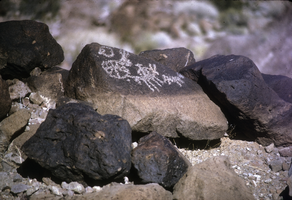
Slide of Petroglyphs on a rock, Boulder City, Nevada, circa 2000s
Date
Unknown year in the decade of the 2000s (year approximate)
Archival Collection
Description
Petroglyphs in the Boulder City Dry Fall Area. The exact location is unknown, but the location is possibly in Keyhole Canyon. Petroglyphs are pictogram and logogram images created by removing part of a rock surface by incising, picking, carving, or abrading. Outside North America, scholars often use terms such as "carving", "engraving", or other descriptions of the technique to refer to such images. Petroglyphs are found world-wide, and are often associated with prehistoric peoples. The word comes from the Greek words petro-, theme of the word "petra" meaning "stone", and glyphein meaning "to carve", and was originally coined in French as pétroglyphe. The term petroglyph should not be confused with petrograph, which is an image drawn or painted on a rock face. Both types of image belong to the wider and more general category of rock art or parietal art. Petroforms, or patterns and shapes made by many large rocks and boulders over the ground, are also quite different. Inukshuks are also uni
Image
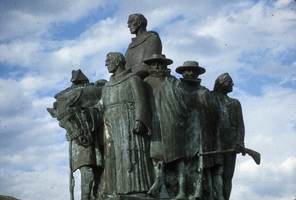
Slide of the This Is The Place Monument, Salt Lake City, Utah, circa 1990s
Date
1990 to 1999
Archival Collection
Description
A statue of early trappers that is inscribed with "This is the place." A view of the left-hand side of the This is the Place Monument. Several individual sculptures make up the full monument. The This is the Place Monument is a historical monument at the This is the Place Heritage Park, located on the east side of Salt Lake City, Utah, at the mouth of Emigration Canyon. It is named in honor of Brigham Young's famous statement in 1847 that the Latter-day Saint pioneers should settle in the Salt Lake Valley. Sculpted between 1939 and 1947 by Mahonri M. Young, a grandson of Brigham Young, it stands as a monument to the Mormon pioneers as well as the explorers and settlers of the American West. It was dedicated by LDS Church President George Albert Smith on 24 July 1947, the hundredth anniversary of the pioneers entering the Salt Lake Valley. It replaced a much smaller monument located nearby.
Image
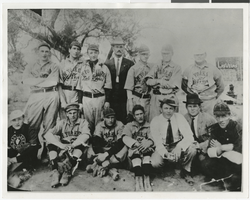
Photograph of New York Store Baseball team, circa 1907
Date
1906 to 1908
Archival Collection
Description
A group photo of a baseball team, possibly in Las Vegas, Nevada. Description provided with image: "Top Row: 1) Walter Houck; 2) Ben Emerick; 3) Frank Black; 4) Harry Beale; 5) H. Floyd Alter; 6) Curley Fennel; 7) Walter "Tubby" Sears. Bottom Row: 1) Mac McCormack; 2) Oswald; 3) Sullen; 4) Cockey Vores; 5) John Kramer; 6) Harley Harmon; 7) Shores."
Image
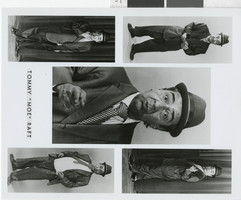
Photograph of Tommy "Moe" Raft, 1972
Date
1972
Archival Collection
Description
A five panel publicity photograph of comedian Tommy "Moe" Raft, a performer in Minsky's Burlesque at the Aladdin Hotel and Casino. The Aladdin opened on April 1, 1966 and closed on November 25, 1997, and was imploded on 7:30pm, on April 27, 1998, except for the Aladdin Theatre to make way for the construction of an entirely new casino. The new Aladdin was scheduled to reopen on August 17, 2000, at 6:00 p.m. The opening was delayed while the Clark County building inspector completed its fire safety testing. Another delay was caused by last-minute repairs to the casino surveillance system. The new Aladdin finally opened the next day at 7:45 a.m. The casino was sold in bankruptcy on June 20, 2003 to a partnership of Planet Hollywood and Starwood Hotels & Resorts Worldwide. Renovations were carried out in stages, allowing the resort to remain open throughout. The retail space formerly known as "The Desert Passage" was converted into the Hollywood-themed "Miracle Mile Shops" and the theatre formerly known as the "Aladdin Theatre" was converted into "The AXIS". After the casino was renovated, it was reopened as "Planet Hollywood Resort & Casino" on April 17, 2007.
Image
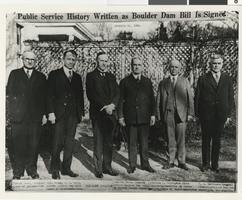
Photograph of principles involved in signing Boulder Dam bill, December 21, 1928
Date
1928-12-21
Archival Collection
Description
Principles involved in the signing of the Boulder Dam bill. L-R: Elwood Mead, Phil Swing, President Calvin Coolidge, Sen. Hiram Johnson, Addison T. Smith, and W.B. Matthews. Text on photo reads: "Public Service History Written as Boulder Dam Bill Is Signed. December 21, 1928. Elwood Mead, Commissioner of Reclamation. Phil Swing, M. C. Cali., Author Boulder Dam bill House of Representatives. President Coolidge. Senator Hiram Johnson, Author Boulder Dam bill in United States Senate. Addison T. Smith, M. C. Idaho, Chairman, Committee on Reclamation, House of Representatives. W. B. Matthews. General Counsel, Boulder Dam Association, Los Angeles."
Image
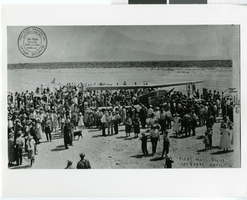
Photograph of the first flight inaugurating contract air mail from Las Vegas to Salt Lake City, Las Vegas (Nev.), April 17, 1926
Date
1926-04-17
Archival Collection
Description
A black and white photograph of a crowd gathering for the first flight inaugurating contract air mail in Las Vegas. A stamp in the top left corner reads: "First flight inaugurating contract air mail, Las Vegas - Salt Lake City, Las Vegas, Nevada April 17, 1926 10:40 a.m." Handwritten on the bottom right corner is: "first mail plane Las Vegas April 17 '26." Three individuals on the right side of the photo are labled: Mayor Hesse, and the Rockwell brothers, owners of the airfield. The Rockwell brothers purchased Anderson Field in 1925 and renamed it Rockwell Field.
Image
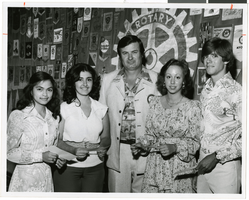
Photograph of Las Vegas, Nevada Rotary scholarship winners with Rotarian Dave Wells, Las Vegas, Nevada, September 22, 1976
Date
1976-09-22
Archival Collection
Description
Rotary scholarship winners with Dave Wells (center), President of Las Vegas Rotary Club. L-R: Rebecca Marzan, Valley High School; Linda Magnus, Gorman High School; Wells; Becky Tilley, Chaparral High; James Deakin, Las Vegas High School.
Image
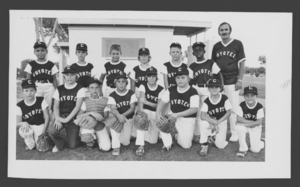
Photograph of the Pee Wee "Coyotes" Little League baseball team and their coach, North Las Vegas, Nevada, May 28, 1975
Date
1905-05-28
Archival Collection
Description
The Pee Wee "Coyotes" Little League baseball team, North Las Vegas, Nevada, May 28, 1975. Front row, left to right: Warren Hampton, Anthony Richardson, Ricky Finkler, Randy Smith, Jerry Pennell, David McDonald, Tommy Pennell, Trevor Pennell. Back row, left to right: Ignatio Navarez, Freddie McGowan, Dennis [LeChase], Shawn [Leake], Jerome Hill, Brian Smith, Coach Don Pennell.
Image

Photograph of United States Air Force Thunderbirds at Nellis Air Force Base, Nevada, October 9, 1979
Date
1979-10-09
Archival Collection
Description
U.S. Air Force Thunderbirds (the Air Force's aerial demonstration team) pilots sit in their planes with canopies open, during an open house at Nellis Air Force Base, Nevada. Planes are labeled with the pilots' names, L-R: SSgt Ramón Badia; Lt Col D. L. Smith; Rob McCall; (?) Shackelford; Capt. Ron Maness; SSgt Mike Cook; Capt Jim Latham; Carl Priddy; Maj. Jim Coziahr; Capt. [Gail] "Scar"Scarborough, Capt. R. D. Evans. Site Name: Nellis Air Force Base (Nev.)
Image
Pagination
Refine my results
Content Type
Creator or Contributor
Subject
Archival Collection
Digital Project
Resource Type
Year
Material Type
Place
Language
Records Classification

